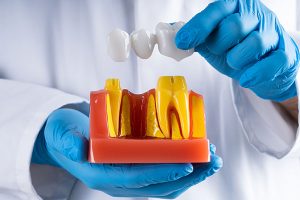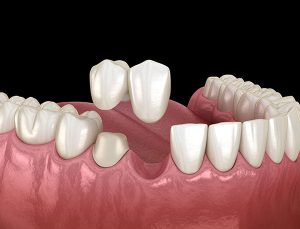Dental Bridges in Luck, WI
Fix Your Smile and Replace Missing Teeth
 Losing a tooth can be difficult, affecting the appearance and functionality of your smile. Fortunately, dental bridges are a popular and effective treatment option for replacing missing teeth. Don’t let your dental health get worse — replace your missing tooth or teeth at Luck Dental Clinic with Dr. Morgan Clemenson.
Losing a tooth can be difficult, affecting the appearance and functionality of your smile. Fortunately, dental bridges are a popular and effective treatment option for replacing missing teeth. Don’t let your dental health get worse — replace your missing tooth or teeth at Luck Dental Clinic with Dr. Morgan Clemenson.
Contact our dentist in Luck today by calling our dental office at (715) 472-2211. We’ll schedule your consultation as soon as possible so you can get your oral health back on track.
What Are Dental Bridges?
Dental bridges seamlessly integrate an artificial tooth into your dental landscape, closing the gaps left by departed natural teeth. Unlike other tooth replacement solutions, bridges can replace up to four missing teeth at once. Thanks to advancements in dentistry, there are several types of bridges, each with unique advantages, to suit your smile.
Types of Dental Bridges
Traditional Dental Bridge
Traditional dental bridges are anchored by dental crowns on adjacent teeth, allowing for a secure and visually appealing replacement for missing teeth. Its ability to seamlessly integrate into the dental landscape ensures functionality and an aesthetic transformation from tooth decay that transcends the ordinary.
Cantilever Dental Bridge
Tailored for specific dental scenarios, cantilever bridges provide a specialized solution, ensuring stability and functionality in situations where conventional bridges may falter. Its design aligns seamlessly with the unique dental landscapes, making them ideal for many patients.
Maryland Dental Bridge
The Maryland dental bridge features a metal or porcelain framework intricately bonded to supporting teeth, it establishes itself as the epitome of choice for those seeking the replacement of front teeth with finesse. Beyond functional attributes, the Maryland bridge adds a touch of elegance to dental restorations, ensuring a seamless integration.
Implant-Supported Bridge
The implant-supported bridge relies on dental implants, providing a robust and enduring support system. The integration of dental implants ensures a stable foundation and a solution that stands the test of time. Implant bridges offer patients a transformative experience beyond tooth replacement.
Benefits of Dental Bridges
 Choosing dental bridges as a solution for missing teeth comes with a host of benefits:
Choosing dental bridges as a solution for missing teeth comes with a host of benefits:
- Restored Smile: Beyond aesthetics, regain the joy and confidence of a complete smile.
- Improved Functionality: Rediscover the pleasure of biting and chewing as dental bridges restore full functionality.
- Maintenance of Facial Structure: Safeguard the natural contours of your face, preventing the unwelcome effects of sagging or shifting features.
- Prevention of Complications: Act as a guardian against potential dental issues, ensuring the longevity of your oral health.
- Long-lasting Restoration: Witness the endurance of a robust tooth replacement solution, promising enduring results.
- Affordability and Confidence-Boosting: Experience a cost-effective solution and a confidence-boosting journey towards a revitalized self-image.
- Minimally-Invasive Transformation: Undergo a dental procedure with minimal disruption, ensuring a swift and comfortable transformation towards a brighter smile.
Candidacy for Dental Bridges
Before embarking on the transformative journey of dental bridges, a thorough assessment of candidacy becomes paramount. Various factors contribute to the decision, ensuring this tooth replacement solution aligns seamlessly with individual needs:
- Location of Missing Teeth: The foundational element in candidacy assessment revolves around missing teeth. A dental bridge requires stable, healthy teeth on either side of the gap to serve as abutments (support).
- Health of Adjacent Teeth: The supporting teeth play a pivotal role in the success of a dental bridge. They should be free of decay and gum disease, showcasing good bone support.
- Number of Missing Teeth: Should there be a larger gap or a more extensive pattern of missing teeth, alternative solutions like partial dentures or dental implants may be considered for a more comprehensive restoration.
- Oral Hygiene: Patients must exhibit good oral hygiene habits or be willing to improve them. A dental bridge demands meticulous cleaning around and under the false tooth/teeth to ensure longevity and prevent complications.
- Gum Health: Untreated gum disease can significantly impact candidacy. Patients with ongoing gum issues may not be suitable candidates until these concerns are adequately addressed.
- Occlusion (Bite) Considerations: The alignment of upper and lower teeth, known as occlusion or bite, can influence the success of a dental bridge. Addressing significant bite issues may be necessary before or in conjunction with a bridge placement.
The Dental Bridge Process
Placing a dental bridge is a straightforward process that involves:
- Preparation of Abutments: The dental bridge procedure begins with the preparation of adjacent teeth, known as abutments. These teeth are reshaped to provide a stable foundation for the bridge.
- Custom-Made Bridge Creation: A custom-made bridge is meticulously crafted to include the replacement tooth or teeth (pontics) and crowns for the abutment teeth. This ensures a precise fit and harmonious integration with the existing dental structure.
- Placement with Dental Cement: The custom-made bridge is then placed over the prepared teeth with dental cement. This cementation secures the bridge in place, providing a fixed and stable solution for missing teeth.
Aftercare for Dental Bridges
 Acquiring a dental bridge is not just a one-time procedure; it marks the beginning of a journey toward sustained oral health and radiant smiles. Aftercare plays a pivotal role in ensuring the longevity and vibrancy of your dental bridge.
Acquiring a dental bridge is not just a one-time procedure; it marks the beginning of a journey toward sustained oral health and radiant smiles. Aftercare plays a pivotal role in ensuring the longevity and vibrancy of your dental bridge.
- Regular Dental Check-ups: Frequent dental check-ups are the cornerstone of aftercare for dental bridges. These appointments allow your dentist to monitor the condition of the bridge, assess your oral health, and address any emerging concerns promptly.
- Oral Hygiene: Diligent oral hygiene practices are non-negotiable for maintaining the health of your dental bridge. Regular brushing and flossing, paying particular attention to the areas around and beneath the false teeth, prevent plaque buildup and safeguard against potential issues.
- Avoiding Hard or Sticky Foods: While dental bridges are durable, it’s advisable to exercise caution with certain foods. Avoid biting into hard or sticky substances that could exert excessive pressure on the bridge and compromise its stability.
- Professional Cleanings: Professional dental cleanings are essential to ensure the cleanliness of hard-to-reach areas around the bridge. Dental hygienists use specialized tools to clean thoroughly, contributing to the prevention of issues like decay or gum disease.
The Costs of a Dental Bridge
While the costs of your dental bridge will vary based on several factors, you can expect to spend between $2,000 and $5,000. Factors that influence the total cost include:
- Geographical location
- Materials used
- The type of dental bridge (cantilever bridge, implant-supported bridge, traditional fixed bridge, Maryland dental bridge) needed
- Number of teeth that need to be replaced
- Dentist’s expertise and experience
- Dental insurance plan
- Additional procedures
Frequently Asked Questions
On average, dental bridges boast a lifespan of five to 15 years. With meticulous care and regular dental check-ups, their longevity can extend further. Implant-supported bridges tend to outlast more traditional bridge options.
Unlike natural teeth, dental bridges cannot be whitened using traditional methods. Selecting an initial shade that matches your desired natural tooth color is crucial. If staining occurs, professional cleaning or, in extreme cases, replacement may be necessary to restore its original appearance.
The dental bridge procedure is generally not painful. Before placement, the adjacent teeth (abutments) are prepared, and local anesthesia is administered to ensure a comfortable experience. Post-procedure, any discomfort is usually manageable with over-the-counter pain relief.
Traditional dental bridges are typically suitable for replacing one to three adjacent missing teeth. The number of missing teeth and their arrangement will influence the type of bridge recommended. In cases with more extensive tooth loss, alternative solutions like partial dentures or dental implants may be considered.
Don’t Let Tooth Loss Run Your Life– Schedule a Consultation
Ready to reclaim your complete smile? Contact Dr. Morgan Clemenson at Luck Dental Clinic by calling (715) 472-2211 to schedule your dental bridge consultation. Embrace the opportunity to restore your smile and confidence. We also welcome patients from Luck, Milltown, and Osceola, WI.
